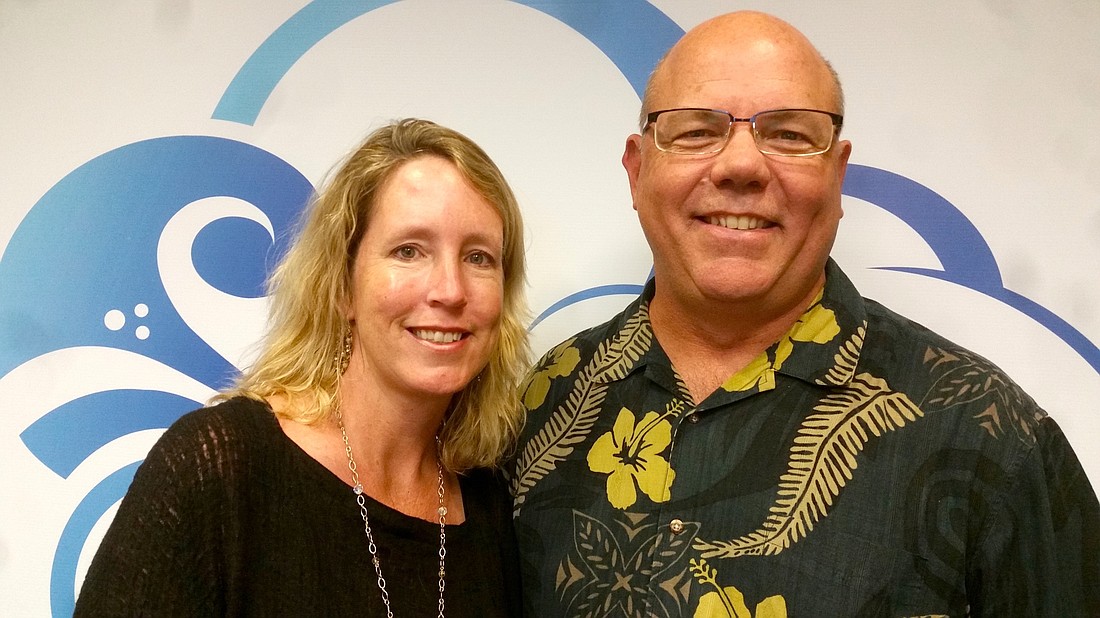- December 28, 2024
-
-
Loading

Loading

(Click here for more Standing O Award winners.)
Mike Cavaliere
Contributing Writer
Tim Hale’s flip flops smack his heels as he walks down Coastal Cloud’s hallways in Hammock Beach. They clap, almost loud enough to echo through the place — especially now that it’s empty inside, lights off in the lobby, black out the windows.
He and his wife, Sara, are working late again.
“We’re always here,” he jokes, Hawaiian shirt, booming voice. But he’s only half-kidding.
The office keeps going: a welcome area, hallway, conference room in back. There’s a corridor that leads to more offices, more desks. It’s room enough for the 40-plus employees who now work for the Hales. Another 40 work out of state.
Coastal Cloud is three years old. It pulled in nearly $10 million in revenue this year.
“There’s just no downtime — which is a blessing and a curse,” Hale says. “That we can operate how we are, at the scale that we are, is kinda crazy.”
But the Hales don’t have an easy elevator pitch. Coastal Cloud is a computer company — well, sort of.
“We have no servers, no phones,” Hale says. “But we’re a next-generation Internet company. What we do have is a big, fat Internet tube.”
If a client wants to migrate files onto virtual servers and rebuild its intranet — Coastal Cloud can do that. If it wants to organize customers, sales or leads by smart phone — they do that, too.
Hale likes to think of himself as a glorified Lego builder.
“We’re like architects,” he says, “not masons.”
They don’t build anything from scratch at Coastal Cloud; they customize, using portals like Microsoft, Salesforce and Amazon. Within that context, he says — using those Legos — you can build almost anything.
“It’s a democratization of software,” Hale says.
Projects that used to require a team of 100, most of them programmers, takes five to 10 today — and 80% of those workers are business analysts, not IT nerds.
With the kind of growth this company has seen — they meet weekly to review sales and consider additional hires — sometimes the Hales wonder if they’re growing too fast.
“Sara and I bootstrapped the company,” Tim says. “So we need to very carefully manage our growth at a pace we can afford.”
“You worry about everything – growing too slow, growing too fast … making sure the quality of the work stays up,” Sara adds.
But seeing their results soothes some of the stress. Plus, they know this business. They each were hired to the same IT consulting firm straight out of college, although they didn’t meet till years later on a job.
Before that, they were traveling full-time. For the first seven years of Sara Hale’s career, she was in the field every week, meeting clients all over the world.
They lived in cool cities, had fun. For a couple of years, they even worked from Hawaii.
“All of a sudden, we were working in paradise,” Tims says. “That sort of shifted our thinking. You really can work anywhere.”
But there were downsides. At one point, they lived in four states and five houses in less than three years.
“We didn’t want anyone telling us where to live next,” Sara says.
So they left the big cities. Discovered Flagler County. Then they started wondering, What if we just stayed here?
Cheaper living meant less overhead, which meant they could undersell the big firms in San Francisco and New York. Living by the beach would lure talent. They could set up satellite offices, work through video conference, offer what overseas firms never could.
A business plan was forming.
“Honestly, we just made up numbers three years ago,” Tim says. “Uh, 100 employees in three years!”
To Sara, that sounded scary.
“But that’s how life is, right?” he says. “You set a goal, and you manage to the goal.”
Now their goals are even loftier.
“I hope that we are the start of a technology move to Flagler County,” Tim says. “We need a thriving economy, to me, to protect the natural beauty of the area. And the key is diversifying it.”
But first — get to 100 employees by early next year. That’s the plan.
Achieving it will mean more late nights at the office. And the Hales are OK with that. Working just comes easier in flip flops.